|
|
|
Sort Order |
|
|
|
Items / Page
|
|
|
|
|
|
|
| Srl | Item |
| 1 |
ID:
132093
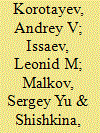

|
|
|
| 2 |
ID:
178935


|
|
|
|
|
| Summary/Abstract |
Fringe terrorism is common during nonviolent campaigns. We examine how this can modify the strategic environment between dissident groups and the state in ways that present both challenges and opportunities to moderate factions. Terrorism is intended to promote violent escalation in a conflict, but we argue that fringe terrorist activities in a nonviolent campaign under certain conditions can induce an advantage for well-organized moderate factions. The risk of escalation following terrorism can give the government more incentives to offer concessions to moderate campaign leaders if the movement can credibly prevent armed escalation. The ability to control and prevent violence is more likely when nonviolent movements have a hierarchical structure and a centralized leadership, as such campaigns are better able to prevent shifts by supporters towards violent fringes. Using new data on terrorist attacks by factions sharing the same overall objectives as ongoing nonviolent campaigns, we show that nonviolent campaigns are more likely to see substantial gains in spite of fringe terrorist activities when a movement has a hierarchical structure and a centralized leadership.
|
|
|
|
|
|
|
|
|
|
|
|
|
|
|
|
| 3 |
ID:
164556
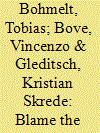

|
|
|
|
|
| Summary/Abstract |
Existing research argues that refugee inflows may increase the risk of domestic conflict, particularly civil war that, by definition, involves the state as an actor. However, many of the postulated mechanisms linking refugees to a higher risk of such conflict pertain to tensions with locals, which do not necessarily involve any grievances against government authorities. We contend that it is more likely to identify an association between refugees and non-state actor violence, that is, armed violence between organized non-state groups, neither of which pertains to the state. We also claim that the extent to which refugees are associated with a higher likelihood of non-state conflict depends on the capacity of governments to manage and mitigate risks. We report evidence that refugee populations can be linked to an increased risk of non-state conflict, as well as for a mitigating effect of state capacity on the risk of non-state conflicts in the presence of refugees. We do not find a clear effect of refugee populations on civil war, suggesting that the link depends on existing conflict cleavages relevant to mobilizing refugees or locals. Our research helps to shed light on the relevant security consequences of managing refugee populations. Despite the common arguments portraying refugees as security risks in developed countries, the risk of non-state conflict applies primarily to weak states that have been forced to shoulder a disproportionate burden in hosting refugees.
|
|
|
|
|
|
|
|
|
|
|
|
|
|
|
|
| 4 |
ID:
189555
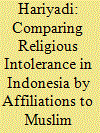

|
|
|
|
|
| Summary/Abstract |
Very few studies explicitly, let alone quantitatively, examine gaps in religious intolerance among individual Muslims based on affiliation with major Muslim organizations in Indonesia. Most existing studies either focus on a single organization (non-comparative), are at the organizational policy level (not examining individual attitudes), or use a limited number of samples in their analysis. Against this backdrop, this study compares Indonesian Muslims’ levels of religious intolerance based on their affiliation with Muslim organizations or traditions: Nahdlatul Ulama (NU), Muhammadiyah, and other organizations. We utilize a large-scale household survey, the 2014 Indonesia Family Life Survey-5, and run an ordinal logistic regression to identify organizations’ rank on the religious intolerance scale. We find that Muslims without any affiliation with a Muslim organization (some 18 percent of Indonesian Muslims) are the most tolerant. Against this reference group, we find that NU followers are generally the most tolerant, followed by those affiliated with Muhammadiyah, and those affiliated with other Muslim organizations. This finding adds a stock of knowledge to our understanding of religion and society, especially regarding interfaith relations in Indonesia and in the Muslim world in general. Methodologically, this study also shows the benefit and feasibility of identifying the dynamic of religious intolerance using a quantitative approach at a micro level.
|
|
|
|
|
|
|
|
|
|
|
|
|
|
|
|
| 5 |
ID:
172822
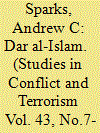

|
|
|
|
|
| Summary/Abstract |
This study is a content analysis of Islamic State of Iraq and Syria (ISIS)’s French-language magazine Dar al-Islam. The first seven issues of the magazine are quantitatively examined and broken down into the number of articles, images, and terms used as a means of determining how ISIS targets French-speaking individuals. This study find that ISIS focuses on religious terminology and justifications to rationalize its existence and its fight. Also, despite being a French-language magazine, a majority of the focus is on Middle Eastern groups, not Western groups. Overall, the magazine is similar, but not a carbon copy to ISIS’s English-language magazine, Dabiq.
|
|
|
|
|
|
|
|
|
|
|
|
|
|
|
|
| 6 |
ID:
108065
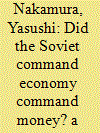

|
|
|
|
|
| Publication |
2011.
|
| Summary/Abstract |
Motivated by recent studies reviewing Soviet money and enlarging the availability of monetary data, this study empirically investigates the Soviet monetary management mechanism: the division of cash and non-cash, and the income and outlay balance. An analysis of correlation between cash and non-cash shows that the division was largely effective, while a calculation of unexpected cash issues indicates that the income and outlay balance was useless. The results suggest that the Soviet monetary management did not work as intended because wages and output were not equilibrated from the beginning, and information and operational instruments to correct monetary imbalances did not exist.
|
|
|
|
|
|
|
|
|
|
|
|
|
|
|
|
| 7 |
ID:
160480
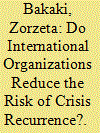

|
|
|
|
|
| Summary/Abstract |
This paper examines the effect of international organizations (IOs) on the recurrence of international crises. In line with existing literature on conflict onset, I suggest that country-dyads with more co-memberships in IOs have a lower probability of fighting again. Moving beyond this claim, however, I argue that the scope and mandate of the IO are not relevant for the risk of crisis recurrence. Ultimately, all types of IOs promote links between states and strengthen their chances for effective international cooperation. Empirically, I examine the probability of crisis recurrence between 1950 and 2008, using the count of dyadic co-memberships as the main explanatory variable. The results show that co-membership in any type of IO has negative and significant impact on crisis recurrence. Moreover, the disaggregation of IOs into different categories (e.g., those dedicated to conflict prevention, peace-brokering, or security) also points to a negative effect. The effects of IOs disaggregated by type, however, are not significantly different from the overall IO impact.
|
|
|
|
|
|
|
|
|
|
|
|
|
|
|
|
| 8 |
ID:
146022
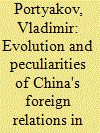

|
|
|
|
|
| Summary/Abstract |
On the basis of methods proposed by scholars of the Institute of Modern International Relations at Tsinghua University (PRC), the author examines the evolution of China's relations with leading countries of East Asia. A forecast is given concerning possible changes in the nature of the PRC's interaction with Vietnam, the U.S.A., Japan, Russia, and the Republic of Korea under the fifth-generation leaders headed by Xi Jinping.
|
|
|
|
|
|
|
|
|
|
|
|
|
|
|
|
| 9 |
ID:
139778
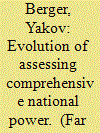

|
|
|
|
|
| Summary/Abstract |
A brief historical review of research to assess the comprehensive national power (CNP) of the world's leading countries is presented. Special attention is given to works by Chinese analysts whose conclusions serve as important assistance in elaborating national strategies of development. The current state and predicted dynamics of the main CNP components are examined: the armed forces and future economic growth of China, particularly in the light of competition from the United States for regional and global supremacy.
|
|
|
|
|
|
|
|
|
|
|
|
|
|
|
|
| 10 |
ID:
130998
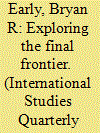

|
|
|
|
|
| Publication |
2014.
|
| Summary/Abstract |
While space capabilities were once concentrated among a handful of leading powers, an increasingly large number of states have gained access to them. As of 2007, 58 countries possessed dedicated civil space programs, 44 countries had placed nationally owned satellites into orbit, and 9 countries had achieved domestic space launch capabilities. To date, however, no systematic inquiries have ever been conducted into which countries acquire space capabilities and why. Within this paper, I develop an explanatory account that explores the capacity-based factors and political motivations that influence countries' acquisition of space capabilities. I test my hypotheses via a quantitative analysis of the factors affecting 143 countries' acquisition of civil space programs, satellite capabilities, and space launch capabilities from 1950 to 2002. My findings shed new light on the primary causes of the proliferation of civil space capabilities and yield a number of important policy implications
|
|
|
|
|
|
|
|
|
|
|
|
|
|
|
|
| 11 |
ID:
159253
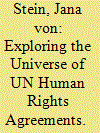

|
|
|
|
|
| Summary/Abstract |
The international human rights (HR) regime is vast and complex. Yet, most of what we know about it draws from a handful of agreements, often chosen for their prominence and/or perceived centrality to the HR project. This article argues that HR research needs to expand its scope to encompass all agreements in this realm, and presents a new data resource that enables scholars to accomplish that goal. Using the data, I demonstrate that the literature has painted an unrepresentative portrait of HR agreements. In addition to making comprehensive analysis possible, the database moves the literature forward by (1) taking into account important legal distinctions in the process of making treaties binding, (2) providing information on treaty design, and (3) considering relationships between agreements. I present several applications and discuss future areas of inquiry. Network analysis and the linking of treaty participation to HR outcomes are two notable areas of interest.
|
|
|
|
|
|
|
|
|
|
|
|
|
|
|
|
| 12 |
ID:
139828
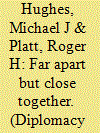

|
|
|
|
|
| Summary/Abstract |
A good deal has been written about the organisation and structure of the British diplomatic establishment since 1945. This analysis uses detailed quantitative and qualitative data to develop an understanding of the background and career trajectories of the most senior figures in the Diplomatic Service in 1975. By tracing their careers, it is possible to identify more precisely than before the changing educational and social background of these individuals when compared with previous generations of diplomats. This analysis also examines certain core features of the culture of the diplomatic establishment during the post-war decades, analysing how it both shaped and was shaped by particular structures and practices. Despite the existence of a peripatetic career structure that dispersed members of the diplomatic establishment around the globe, there were still numerous opportunities for the kinds of personal contact necessary to maintain an integrated culture.
|
|
|
|
|
|
|
|
|
|
|
|
|
|
|
|
| 13 |
ID:
126582
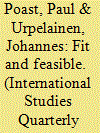

|
|
|
|
|
| Publication |
2013.
|
| Summary/Abstract |
Does democratization make states join existing international organizations (IOs)? Previous research suggests that democratization increases a state's propensity to join IOs capable of assisting in the distribution of public goods and establishing credibility for domestic reforms. We argue that this is not the case. Instead, recent democratization has a strong effect on a state's propensity to form new IOs. Since democratizing states face different governance problems than established democracies, existing IOs may not be a good "fit." Additionally, established democracies might hesitate to allow democratizing states membership in the most lucrative existing IOs, thereby making immediate accession to such IOs not "feasible." Quantitative analysis shows that democratization has a strong and consistently positive effect on the probability of forming a new IO, but not on the probability of joining an existing IO. The findings suggest that international cooperation theorists should begin to analyze forming new and joining existing IOs as alternative strategies that states can use to achieve their policy goals.
|
|
|
|
|
|
|
|
|
|
|
|
|
|
|
|
| 14 |
ID:
188075
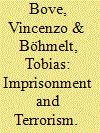

|
|
|
|
|
| Summary/Abstract |
While policymakers frequently praise the impact of law enforcement for addressing the threat of terrorism, several cases suggest that the imprisonment of terrorists and potential perpetrators may actually lead to (more) radicalization and, ultimately, a higher risk of terrorism. We take systematic stock of the arguments linking terrorism with incarceration and analyze newly collected data on worldwide prison populations. The results from quantitative analysis highlight that an increase in prison population is correlated with a decline in the number of terrorist attacks, in particular its domestic form. We conclude with a discussion of the implications of this finding for academic and policy circles.
|
|
|
|
|
|
|
|
|
|
|
|
|
|
|
|
| 15 |
ID:
190997
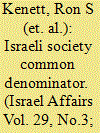

|
|
|
|
|
| Summary/Abstract |
The core of this article is the search for an ‘organizing principle’ for the State of Israel in the present era. To approach this core goal, it conducted 40 interviews with well-known and influential Israeli individuals and attempted to identify common grounds of Israeli society. Analysis of the interviews finds a broad common denominator among those with a wide variety of opinions, which is closely linked with the major principles of the Declaration of Independence of the State of Israel.
|
|
|
|
|
|
|
|
|
|
|
|
|
|
|
|
| 16 |
ID:
130997
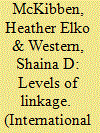

|
|
|
|
|
| Publication |
2014.
|
| Summary/Abstract |
Decisions in international institutions such as the European Union (EU) are often made by consensus, even when it is not required. Tit-for-tat exchanges provide an explanation for this phenomenon, as such exchanges can help to build up support for agreements states might otherwise not have had an incentive to support. Tit-for-tat exchanges are typically analyzed as trades of support across agreements. However, we argue that the priority of negotiators to further their national and bureaucratic interests makes exchanges across micro-level issues within a single proposal for agreement more prevalent than exchanges across agreements. Using both qualitative and quantitative analyses, we show that such within-agreement, rather than cross-agreement, linkages are related to an increased likelihood of consensus across an array of different EU agreements. To understand consensus in international institutions, more broadly, it is therefore necessary to look at the substantive issues at stake within each agreement
|
|
|
|
|
|
|
|
|
|
|
|
|
|
|
|
| 17 |
ID:
178645
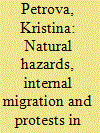

|
|
|
|
|
| Summary/Abstract |
Does internal migration following natural hazards increase the likelihood of protests in migrant-receiving areas? To address the question, this study first looks at the extent to which experiencing different forms of natural hazards contributes to a household’s decision to leave their district of residence. In a second step, the article explores whether that internal migration flow increases the number of protest events in migrant-hosting districts. In doing so, it contributes to the existing debate on the extent to which natural hazards impact the likelihood of social contention, and the role of migration as a linking pathway in that relationship. The impact of climate-related shocks may erode household assets and therefore adaptive capacity in ways that can eventually influence decisions to migrate to larger urban centres. Although migrants are agents of economical and technological change, urban environments may impose challenges to recently arrived migrants and their host communities, affecting the motivations and mobilization resources of urban social groups to protest. As a consequence, the probability of urban unrest in these locations is expected to increase. To test this, I use geo-referenced household-level data from Bangladesh for the period 2010–15, which records households’ experiences of different forms of natural hazard and internal migration flows, available from the Bangladesh Integrated Household Survey. It combines this with data on protests, derived from the Armed Conflict Location and Event Data. Findings suggest that flood hazards in combination with loss of assets increase the likelihood of internal migration, but unlike other types of domestic mobility, hazard-related migration does not increase the frequency of protests in migrants’ districts of destination.
|
|
|
|
|
|
|
|
|
|
|
|
|
|
|
|
| 18 |
ID:
140864


|
|
|
|
|
| Summary/Abstract |
Why do some of Afghanistan's provinces experience more deadly attacks on counterinsurgents than others? We argue that provinces with more militarily effective insurgents will be deadlier for the forces of the counterinsurgency. We posit that insurgent military effectiveness is an interactive function of the rebel group's size, the quality of its recruits, and the group's operational budget. More militarily effective insurgents should, in turn, produce more deadly violence against Coalition forces. We model this relationship at the provincial level in Afghanistan using negative binomial regressions. Ultimately, we find that in provinces where the insurgency is more militarily effective, deadly attacks against counterinsurgent forces occur more often. Based on this finding, we conclude with directions for future research and policy recommendations for both the current operations in Afghanistan and for future counterinsurgency campaigns.
|
|
|
|
|
|
|
|
|
|
|
|
|
|
|
|
| 19 |
ID:
183012
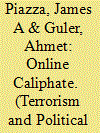

|
|
|
|
|
| Summary/Abstract |
Experts argue that the internet has provided expanded opportunities for violent extremist groups to propagandize and recruit. The Islamic State of Iraq and Syria, or ISIS, is an exemplar in that it has heavily invested in an online presence and uses online communities and social media to attract and retain supporters. Does ISIS’s online presence translate into a higher probability that individuals in its target audience will become supporters? In this study we analyze over 6,000 individuals in six Arab countries to find if those that use the internet to follow political news or to express political views are more likely to support ISIS. We find that respondents who get their news online are significantly more likely to support ISIS than those who follow the news on television or print media. Moreover, those who use online fora for political expression are also more likely to express support for ISIS. Indeed, individuals who engage in online political discussion are more likely to support ISIS than those who engage in conventional political activity, though less than those who engage in contentious political behaviors such as attending a political protest. We conclude with a brief discussion of the academic and policy implications of these findings.
|
|
|
|
|
|
|
|
|
|
|
|
|
|
|
|
| 20 |
ID:
040903
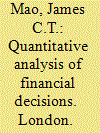

|
|
|
|
|
| Publication |
London, Macmillan Company, 1969.
|
| Description |
xiv, 625p.Hbk
|
|
|
|
|
|
|
|
|
|
|
|
Copies: C:1/I:0,R:0,Q:0
Circulation
| Accession# | Call# | Current Location | Status | Policy | Location |
| 002773 | 658.15/MAO 002773 | Main | On Shelf | General | |
|
|
|
|
|
|
|
|
|